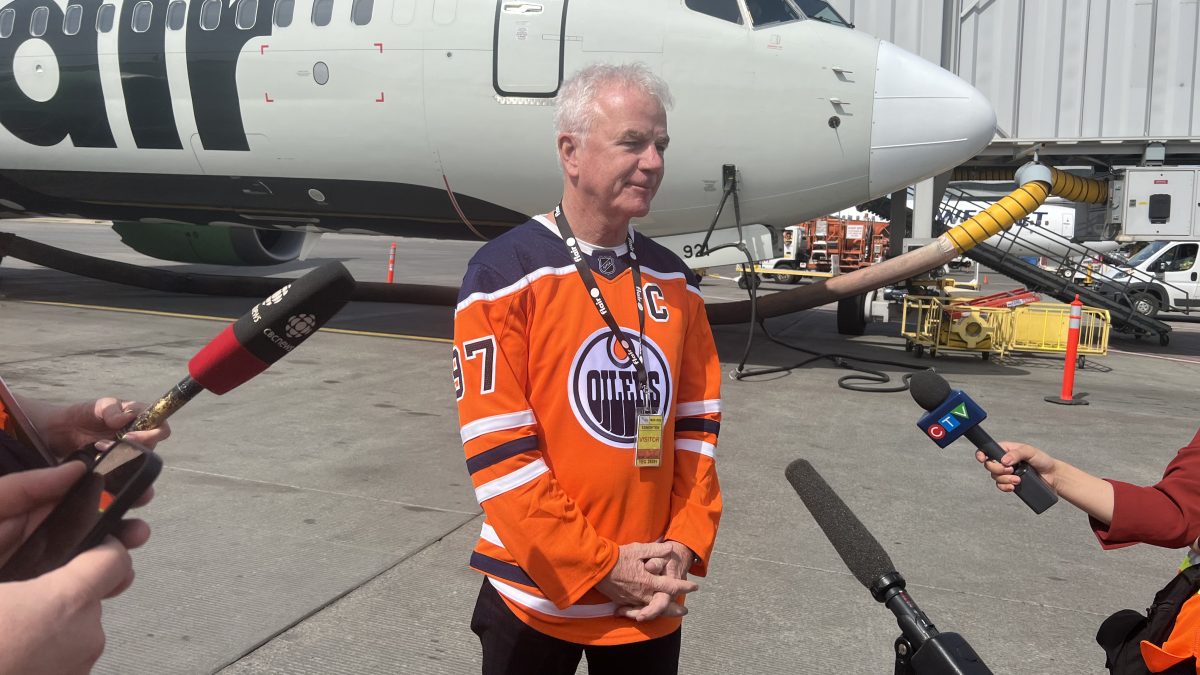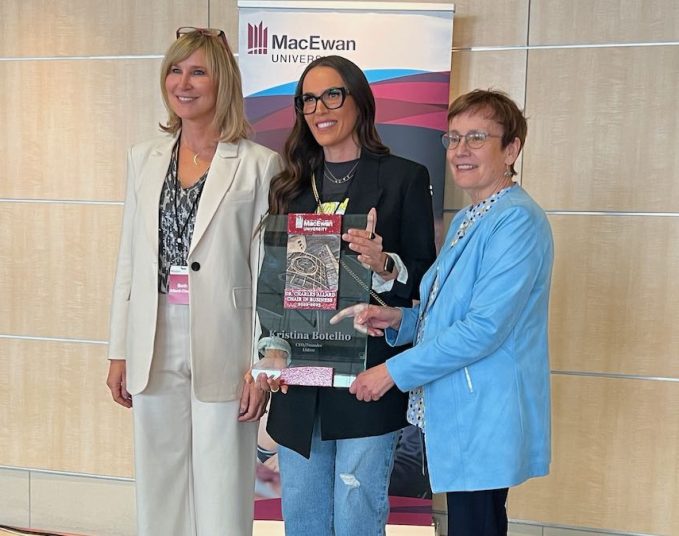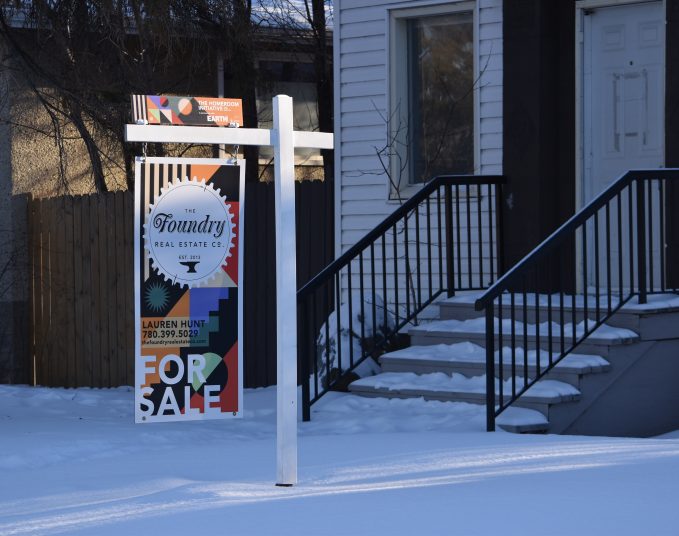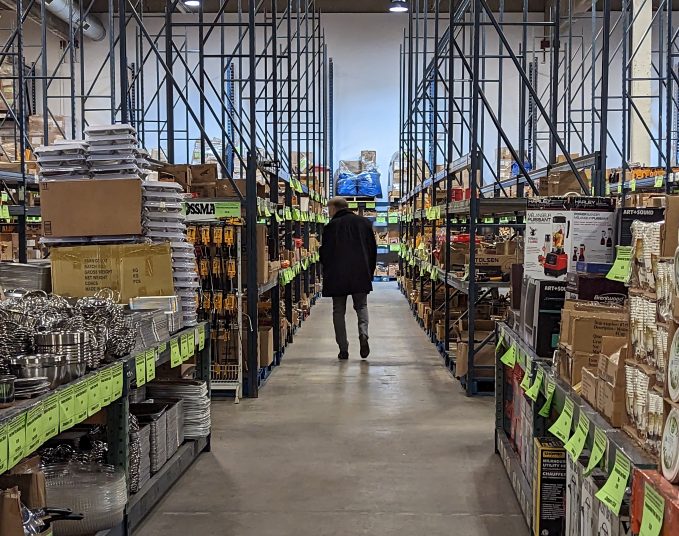Maybe it’s not a surprise that a CEO named Stephen Jones comes off as a bit of the anti-establishment type.
Flair Airlines’ boss shares the name as the Sex Pistols’ legendary guitarist (OK, he’s Steve Jones), the co-author of one of the greatest anti-establishment pieces of art ever produced, Never Mind the Bollocks, Here’s the Sex Pistols.
The low-cost carrier’s boss was front and centre at Edmonton International Airport this week, wearing a bright orange Oilers jersey as his six-year-old airline invited the media for a tour of a 737 MAX8 aircraft. These sorts of events are filled with key messages and soundbites meant for the media to access easy talking points.
Jones referred to the low-cost, leisure airline as a “challenger brand,” intentionally positioning Flair as a disruptor.
“I’ve talked a lot about that, 10 years from now, I’m sure Air Canada is still going to dominate the business part of the market, the global carrier, the global alliance,” said Jones. “But I’m sure there’s going to be a low-cost carrier that’s dominating the leisure sector. And we intend for that to be Flair… You have to pick a lane and stay in your lane. And our lane is low-cost leisure.”
Many times, at the end of a media scrum or interview, the open-ended “is there anything you want to add” is tacked on; it’s our way of being polite, really. Usually, nothing useful comes from this question, but it offers closure to the interview or media availability.
But, when Jones was asked about it, we got a bit of insight on how the discount leisure airline will position itself against the likes of Air Canada and WestJet. And one of the ways is to show the world that having full planes, with no luxury-seating options, is well, greener.
“The big issue for the industry is sustainability — not just economic sustainability, but accepting our role in climate change. With that, we have the world’s most efficient aircraft, and the ultra-low-cost model has particularly lower emissions. We’re all-economy class, so we’ve got as many seats as possible in the aircraft, and we sell to as high a load-factor as possible. So, the emissions per-person per mile is as low as they could possibly be.”
The message here? Business class and first class and any sorts of luxury class — well, they’re not efficient uses of space on a fuel-guzzling, carbon-spewing aircraft. So, do you stop to think about how much pollution you’re creating when you’re leaning way, way, way back and enjoying a canape or two?
Then, Jones doubled down.
“You could argue that business class are the climate criminals, here,” he said. “As they watch everyone else go to the back of the aircraft, but they’ve got the biggest emission footprint of anyone.”
That sounds like something Johnny Rotten or the other Steve Jones might say. Heck, Jones (the airline exec, that is) said the fact that Flair doesn’t have chairs that recline shaves a couple of percentage points off the aircraft’s weight, making it more efficient. And, no route is ever the same, as airlines look to take advantage of tailwinds and mitigate headwinds to ease the load on the engines.
The Edmonton-based carrier has just over 20 planes in service, and its goal is to grow its fleet to 50 by 2030. The Boeing 737 MAX8 is the aircraft of choice, because it’s 18 per cent more fuel efficient than the generation of 737s before. Flair claims that it’s annual economic impact on the region — direct jobs, tourism activity — is worth about $100 million annually.
But it hasn’t been smooth. While Jones boasted that Flair was at 90 per cent capacity in April, and the loads will go up this summer, as airlines cope with pent-up travel demand, there has been turbulence along the route.
In March, four of Flair’s airplanes were seized by an American hedge fund that claimed the airline was late on its lease payments. Flights had to be canceled. Flair claimed that the hedge fund colluded with a rival airline to damage Flair’s operations and reputation. That matter will now go to the courts.
(Remember that the Sex Pistols had two separate record companies agree and then withdraw plans to release their first album, too).
How does Flair recover? Jones said it’s all about the service going forward.
“That’s well behind us now, and I think that’s evidenced by the 90 per cent load factors. People want to fly with Flair.
“But the only way you can shake it (a reputation, that is) is by providing better service,” said Jones. “We accept and apologize for the disruptions we have had in the past. We’re focused on better service.”
Flair, and most airlines around the world, have one big challenge to overcome — and that’s a global shortage of pilots. Many retired during the height of the pandemic, and the industry needs more.
Matt Kunz, a captain and the airline’s vice-president of flight operations, said airlines will need to have progressive strategies to cope in what has become an ultra-competitive market for labour.
“The problem stems from the fact that there’s been a boom in the growth in airlines around the world, and it’s very cyclical in terms of pilots’ ages,” said Kunz. “There’s been a large amount of pilots retiring in the last two, three years — and in the next five years. So, it’s a bit of a double whammy.
“It’s been a challenge for us as a growing airline. We had some advantages in the early time of COVID, because a lot of the foreign airlines were laying Canadian pilots off, and those pilots were returning to Canada. And one of the advantages that Flair has, as a growing airline, is that you can join as a captain — which is something you can’t do at Air Canada or WestJet. We attracted some highly experienced pilots that way.
“We’re a rapidly growing airline, so that if you’re a young first officer, the chance to move to a captain’s position is a much shorter period of time.
“But, all the airlines are vying for pilots, and there are more jobs than there are pilots. Prior to COVID, we had about 1,200 to 1,500 pilots graduating per year. I think, in the last year, we were down to 300. So, we have a supply problem, we don’t have young kids moving into the aviation profession.”
Savvy AF. Blunt AF. Edmonton AF.




